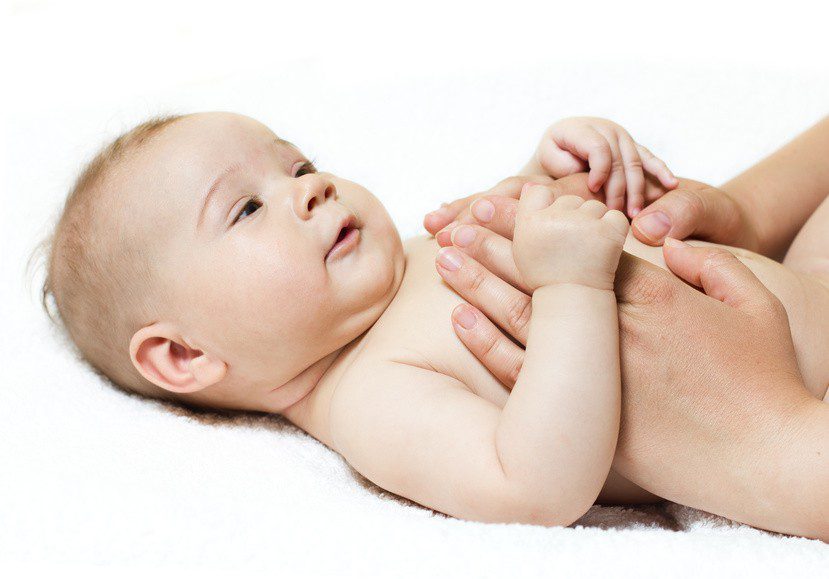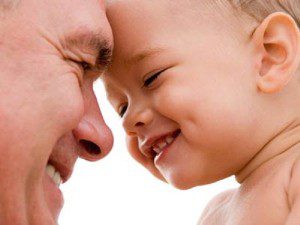June 5, 2019
Infant massage is one tool we have to help reshape our child’s interpretations of the world, to release her pain, grief, and fear, and to open her up to love and joy.
Touch meets a baby’s needs for physical contact, affection, security, stimulation, and movement. Skin-to-skin contact is especially effective, such as during breastfeeding, bathing, or massage. Carrying or babywearing also meets this need while on the go. Hugs, snuggling, back rubs, massage, and physical play help meet this need in older children.
In our great-grandmothers’ day, when a baby developed a fever, the outcome was uncertain. Each century’s children have been plagued with some debilitating disease. Though many contagions have been eliminated through improved environmental conditions and medicine, our century is characterized by a more subtle and insidious malady — stress.
Stress can begin to affect a baby even before he is born. The levels of stress hormones that are constantly present in a woman’s bloodstream directly affect her unborn infant, crossing the placenta to enter his own bloodstream. Studies have shown that prolonged tension and anxiety can hamper a pregnant woman’s ability to absorb nourishment. Her baby may be of low birth weight, hyperactive, and irritable.
If we understand that our experiences and reactions influence our own biochemistry by sending life-enhancing or fear-producing chemicals throughout our bodies, it is not difficult to understand that these chemicals are also sent through our unborn baby’s body. Her cells receive this “information” and program her structure accordingly. Thus, even before birth, a baby can unconsciously perceive the world as a place of anxiety and stress, to fight or be victimized by, or a place of safety and love, to enjoy and fully experience. This is not to say all is lost if life circumstances are less than perfect. Infant massage is one tool we have to help reshape our child’s interpretations of the world, to release her pain, grief, and fear, and to open her up to love and joy. As we evolve to be more conscious beings, we understand more deeply how important our mind states are, both to our own health and longevity and to our children’s health, longevity, intelligence, and ability to experience and give love and joy.
Babies born centuries ago in more primitive cultures had the advantage of extended families, natural environments, and relatively little change. Our children, born into a rapidly advancing technological world, must effectively handle stress if they are to survive and prosper. Thus must give them every opportunity, from conception on, to learn positive, adaptive responses to stress and to believe in their own power and adaptability.
We certainly cannot eliminate stress, nor would we wish to, for in the proper doses it is an essential component in the growth of intelligence. Let’s see how this works. In times of stress, the pituitary gland produces a hormone called ACTH (adrenocorticotropic hormone), which activates the adrenal steroids, organizing the body and brain to deal with an unknown or unpredictable emergency. In experiments with laboratory animals, this hormone has been found to stimulate the production of many new proteins in the liver and brain — proteins that are instrumental in both learning and memory. On being given ACTH, the animals’ brains grow millions of new connecting links between the neurons (thinking cells). These links enable the brain to process information.
The stress of meeting unknown situations and converting them into what is known and predictable is essential for our babies’ brain development. But stress is only part of the cycle that enhances learning. Without its equally important opposite — relaxation — stress can lead to overstimulation, exhaustion, and shock. When stress piles upon stress without the relief of an equal portion of relaxation, the body begins to shut out all sensory intake and the learning process is completely blocked. As neuroscientist Bruce Lipton described, between the two choices — protection-related or growth-promoting — protection-related biological behaviors kick in, thus preventing growth or learning.
How does this apply to infant massage? First, massage is one way we can provide our children with relaxing, joyful experiences. Through the use of conditioned response techniques similar to those developed for childbirth by Lamaze and others, we can teach our babies how to relax their bodies in response to stress. The ability to relax consciously is a tremendous advantage in coping with the pressures of growing up in modern society. If acquired early in life, the realization response can become as much a part of our children’s natural system as the antibodies that protect them from disease.
Stress is a natural part of an infant’s life, but often our babies are not able to benefit from it as much as they could. Our fast-paced society overloads them with input, but it is unacceptable for them to cry to release tension. This double bind leads to many frustrated babies with a lot of pent-up tension and anxiety.
Massage helps babies practice handling input and responding to it with relaxation. Watch an experienced mother massaging her baby. You will see both stress and relaxation in the rhythmic strokes and in the baby’s reactions. Te infant experiences all kinds of new sensations, feelings, odors, sounds, and sights. The rumbles of his tummy, the warm sensation of increased circulation, the movement of air on his bare skin — all are mildly stressful to him. The pleasant tone of his mother’s voice, her smile and her touch are relaxing and relieve the discomfort of encountering these new sensations. The reassures him that the world outside the womb is, as Dr. Frederick Laborers says, “still alive, and warm, and beating, and friendly.”
A daily massage gradually raises an infant’s stimulation threshold. Babies who have difficulty handling stimulation gradually build tolerance. High-need babies begin to learn to regulate the manner in which they respond to stressful experiences, which reduces the level of tension they develop throughout the day. Colicky babies are calmed and able to relax their bodies so that tension doesn’t escalate their discomfort. A regular massage provides our babies with an early stress management program that will be valuable to them in years to come.
Psychologists study the types of attachments we form in our infant as predictors of the types of relationships we will have as adults. People whose infancy was secure, who were held and listened to, who had good eye contact with their parents, and who were generally cherished tend to have healthier relationships with others. Getting close to others is easy, and they have no problem with interdependency (the ability to depend on and be depended on, appropriately). They have happy, trusting relationships; their romances last the longest and end in divorce the least often of groups studied. On the other hand, babies whose attachment bonds are insecure or anxious are later less sympathetic to others and less effective in getting support and help from other people. Their relationships lack trust and intimacy; jealousy and commitment problems and fears undermine friendships as well as marriages. People whose bonds are constantly broken in infancy have a much greater risk of becoming sociopathic criminals in their adulthood, unless they receive serious intervention at an early stage.
The bonds of trust and love, the lessons of compassion, warmth, openness, and respect that are inherent in the massage routine will be carried by your child into adulthood. Especially if your parenting practices reflect the same values of infant massage, your child will be more likely to respond to others with compassion and altruism, and to experience life as a joyful adventure in which he has the opportunity to love and be loved — to help others and extend himself in genuine service to humanity.





